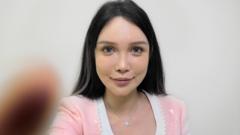Influencers purporting to combat Polycystic Ovary Syndrome (PCOS) are becoming increasingly common on social media, leading many women to dangerous misinformation and costly unproven treatments. Sophie, who suffered for over a decade with painful symptoms ranging from depression to weight gain due to PCOS, was drawn into the scheme of influencer Kourtney Simmang after struggling to find adequate medical support. Simmang advertised a costly regimen, including laboratory tests and dietary protocols, that lack medical endorsement and clinical validity.
Dr. Jen Gunter, a gynecologist and women's health educator, noted that Simmang, and similar influencers, lack the necessary qualifications to provide the tests and services they offer. Despite spending nearly a year engaging with Simmang's program, Sophie found no improvement in her symptoms, leading to self-blame and a worsened relationship with her body.
This dissemination of false information culminates in the exploitation of a vulnerable demographic, as up to 70% of women with PCOS remain undiagnosed globally, per the World Health Organization (WHO). Many influencers, some boasting millions of followers, present themselves as health experts without formal medical training, creating a loophole for spreading misinformation. Tracking data from TikTok and Instagram revealed that half of the most viewed PCOS-related content was misleading.
Influencers typically claim that PCOS can be cured through dietary supplements or lifestyle changes, like adopting a keto diet, while disregarding established medical treatments. In many cases, these claims have been debunked; birth control pills, for instance, are actually prescribed to treat symptoms for many women with PCOS rather than exacerbating them.
One prominent influencer, Tallene Hacatoryan, promotes various supplements and discredits traditional medical approaches, urging a "natural healing" route. Such instructions often lead to detrimental experiences; Amy from Northern Ireland shared that following Hacatoryan's recommendations for a restrictive diet made her health suffer, leaving her feeling inadequate.
Dr. Gunter cautioned that the promotion of unverified lifestyle changes could even trigger serious eating disorders among impressionable women. Responses from TikTok and Meta highlight an awareness of the potential dangers but stress limited control over user-generated content concerning such sensitive health topics.
As women with PCOS face societal stigma and inadequate medical advice, individuals like Medlyn, a Nigerian medical student, advocate for realistic and scientifically-backed treatments rather than fallacies propagated online. Empowering women to seek credible medical advice over influencer-led promotions is essential.
Experts like Sasha Ottey remind patients that with proper medical care, women with PCOS can have families and lead fulfilling lives. Meanwhile, those like Sophie continue to navigate through their health struggles, searching for effective treatment options amidst rampant misinformation on social media.





















